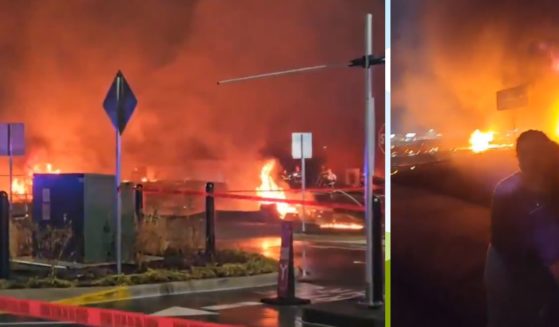
EV Warning Issued After Hurricane Blows Through - Tow Away from Structures, Combustible Objects
Electric vehicles can catch fire if they are inundated by saltwater, so owners who live in the path of a major storm like Hurricane Helene should take precautions and prepare for the possibility that they’ll be unable to charge their cars during a power outage.
Florida Gov. Ron DeSantis urged EV owners this week to get their vehicles to higher ground before Hurricane Helene arrived. Although the problem is rare, there have been a number of instances in recent years of electric vehicles igniting after hurricanes.
Keeping electric vehicles out of standing water is the best way to avoid the possibility of a fire.
Tesla offers similar advice about avoiding letting its vehicles become submerged if at all possible, but if that does happen the carmaker suggests towing the vehicle at least 50 feet away from structures or anything combustible until it can be inspected by a mechanic.
The best way to get through a power outage is to follow the same kind of advice your dad may have given you about keeping your gas tank full to make sure you wouldn’t be stranded. Keeping your electric vehicle charged offers the most flexibility.
Of course, electric vehicle owners won’t be able to charge their cars during a power outage, so they may need to watch how much they drive. But EVs aren’t any worse off than conventional vehicles because gas stations can’t pump fuel in a power outage either.
The National Highway Traffic Safety Administration has been researching this problem since it was first seen after Hurricane Sandy struck the Northeast in 2012. But no one seems to have detailed statistics on just how often this happens.
Two years ago, Hurricane Ian compromised the batteries of as may as 5,000 electric vehicles, and 36 of them caught fire.
Several more electric vehicles caught fire in Florida last year after Hurricane Idalia, although that storm was weaker than Ian. Researchers at NHTSA speculated that it may have also helped that more people were aware of the problem and moved their vehicles to higher ground before that storm.
But it happens often enough that Florida officials were worried about the possibility before Hurricane Helene arrived because they were expecting a potentially devastating storm surge up to 20 feet deep in the northwestern part of Florida.
These fires do seem to be linked specifically to saltwater because salt can conduct electricity. Similar problems haven’t been reported after freshwater flooding in California that was driven by heavy rains early this year.
Electric vehicles with lithium ion batteries can catch fire if the batteries short circuit and start to heat up. Tom Barth with the National Transportation Safety Board said that if the heat starts to spread between different cells in the battery back it can cause a chain reaction called thermal runaway.
“If the saltwater is able to bridge the gap between the positive and negative terminals of battery, then it can cause a short circuit,” said Barth, who is chief of the special investigations branch of the NTSB’s office of highway safety.
Carmakers do design their batteries to try to prevent this problem. There are often separations or insulation barriers between different cells in the battery pack, and manufacturers take steps to keep moisture out. But they do have to include ways for the batteries to vent heat.
“Where it begins to be a problem is if you have the batteries submerged in standing water. That’s where it starts to overcome the moisture seals in the battery,” Barth said.
Sometimes electric vehicles can catch fire long after the floodwaters have receded because even after the water evaporates salt that can conduct electricity may be left behind. So it’s important to have them checked out if they are submerged.
“It’s not like every vehicle that gets flooded is therefore going to ignite and catch fire,” Barth said.
The National Highway Traffic Safety Administration said it is working to improve battery safety as officials learn more about the problems. The agency has proposed updating some of the safety requirements for electric vehicle batteries to reduce the risks.
The Western Journal has not reviewed this Associated Press story prior to publication. Therefore, it may contain editorial bias or may in some other way not meet our normal editorial standards. It is provided to our readers as a service from The Western Journal.
Truth and Accuracy
We are committed to truth and accuracy in all of our journalism. Read our editorial standards.
Advertise with The Western Journal and reach millions of highly engaged readers, while supporting our work. Advertise Today.












